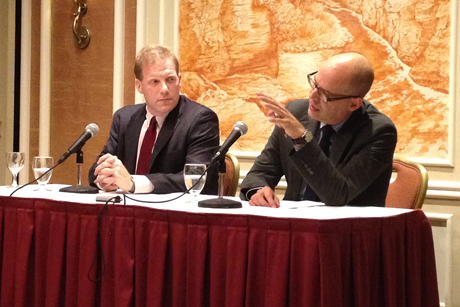Two historians put Kennedy legacy in context
By Claire Lambrecht

What might have been, asked historians Fredrik Logevall and David Greenberg at the Cornell Club Oct. 15, if Lee Harvey Oswald’s 1963 gunshot had missed?
Nearly 50 years later, the question of what might have come to pass – particularly in Vietnam – if President John F. Kennedy had survived his trip to Dallas isn’t an easy one to answer, even for Logevall, the John S. Knight Professor of International Studies, vice provost for international affairs and director of Cornell’s Mario Einaudi Center for International Studies, and David Greenberg, associate professor of history and of journalism and media studies at Rutgers University.
“There is something in particular that captivates people about the Kennedy question, and especially with Vietnam,” Greenberg told the audience.
To historians like Greenberg, author of “Nixon’s Shadow: The History of an Image,”the Kennedy assassination stands out as an inflection point separating the Camelot idealism of the Kennedy White House from the social upheaval of the antiwar movement and later Watergate.
“The Kennedy assassination seems like an engine of history. Where, if only he had lived, it all might have been different. We might not have plunged into Vietnam. We might not have had this rebellion in the streets. We might not have ended up with Nixon as president,” Greenberg said.
To Logevall, author of the 2013 Pulitzer Prize-winning “Embers of War: The Fall of an Empire and the Making of America’s Vietnam,” imagining how history might have been helps provide context for recorded history.
“We can better understand what did happen by imagining what might have happened,” Logevall said.
Particularly on Vietnam, the record might have been different if Kennedy had survived his trip to Dallas and won re-election in 1964.
“Kennedy had a skepticism about the efficacy of military power that [Lyndon B.] Johnson didn’t,” said Logevall, pointing to Kennedy’s speeches and his temperament during the Cuban missile crisis. Kennedy’s more open advisory system and World War II military experience also set him apart, Logevall said.
“I’m inclined to think that a surviving Kennedy does not Americanize the war to the same extent as his successor,” he said.
Though American involvement in Vietnam under Kennedy did expand throughout 1961-63, thereby reducing presidential maneuverability, Logevall said he thought that Kennedy would have ruled out committing large-scale U.S. ground forces during his second term.
While it is impossible to know for sure what might have been, the question remains a compelling one to ask.
“I think [that] however we come down on the answer to that question, what’s really interesting is how much power that question has over us,” Greenberg said.
To Greenberg, the power of that question reflects the malaise of the pre-Kennedy era as well as the sense of national purpose Kennedy championed during his campaign and presidency.
“Rhetorically, and in some ways legislatively … he did set the country on the challenge of regeneration, of finding a sense of national mission,” he said, even though Kennedy’s record lacks the legislative heft of subsequent administrations.
For Greenberg, this helps explain Kennedy’s widespread popularity even decades after Kennedy’s tenure came to its tragic conclusion.
Claire Lambrecht ’06 is a freelance writer based in New York City.
Media Contact
Get Cornell news delivered right to your inbox.
Subscribe